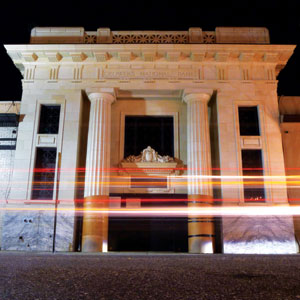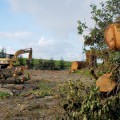In its nearly 100 years of existence, the Gaslighter Theater in Campbell has gone from holding sharecropper’s cash as a bank in the 1920s and showing movies during World War II to being a small-stage theater for vaudeville acts and an all-ages rock venue as recently as 2006. At that time, the white marble landmark, with thick columns bracketing the entrance, was closed temporarily so it could be refashioned as a lounge.
Five and a half years later, the Gaslighter remains dark. But there’s hope the theater could be resurrected in coming months if it can overcome the kind of obstacles that frequently crop up in small town development battles.
The South Bay nightclub veterans who operate of Sabor and Myth Taverna and Lounge in San Jose have been working to reopen the Gaslighter as a restaurant and bar called Dasha. “It is my intention is to bring the Santana Row crowd back down to Campbell,” says Ray Shafazand of Melodann Inc., which has teamed up with property owner West Hall Properties, LLC to launch the project.
Holding up the potential migration of nightlife customers south on Winchester is a strict alcohol ordinance that Campbell imposed in 2009. The Downtown Alcohol Beverage Policy prohibits any new establishments from serving drinks after midnight. In October, the city’s Planning Commission unanimously opposed Melodann’s application for a conditional use permit (CUP) on the grounds that the application would violate the ordinance. Underlying the technical objections are some cultural issues related to just how stylish a downtown befits a town whose central district was not too long ago populated by prune packing warehouses.
“The applicant talked about comparing this club to a club in New York City,” planning commissioner Phil Reynolds reportedly said at the time of the CUP denial. “Campbell is not New York City. Campbell is Campbell.”
Several dozen community members speaking against the project at the commission meeting amplified the Our Town chorus. They used the investor group’s marketing materials, which promised a “Las Vegas-style” nightclub with an atmosphere resembling the club Tao in New York, as ammo.
“Probably, there could have been better examples,” admits Bill Gates, an attorney for Melodann, “but those are the ones they’ve used.”
The chorus of objections prompted Dasha to scale back its ambitious plans in the hope that an appeal with Campbell’s City Council, which will reconvene Jan. 3, will fall upon more receptive ears.
“That was our intention at the beginning—to get an extremely upscale venue there—but we’ve been beaten up so much we scaled it down to a regular upscale restaurant like Santana Row,” says Shafazand, noting that the club will now hold a maximum of 250 people.
What confounds Shafazand and others in his group is that plans for the club were unanimously approved in 2006—only at that time, the CUP request came from Nick D’Arpino, who was in the process of buying the property. A few years later, Campbell instituted its downtown beverage ordinance, after a noticeable uptick in the number of alcohol-related arrests.
{pagebreak}
There have been minor tweaks to the ordinance in recent months, and it’s no secret that they were made to benefit existing businesses. But it seems that the fight over the Gaslighter’s future has become personal for some.
Rep Grows Bigger
Campbell’s permit process has been criticized before as business unfriendly. D’Arpino tried to purchase the Gaslighter in 2006 from Mark Gaetano, whose family owned and operated the theatre for almost 30 years. The Gaetanos told Metro at the time that problems with the city’s redevelopment agency began in 2002, when the agency demanded payment for late-night-hour and live-entertainment permits that had never before existed.
Fed up, the Gaetanos tried to sell the property to D’Arpino, who had no luck getting Motion Ultra Lounge off the ground and was unable to cover the mortgage payments. The property then reverted back to the Gaetanos, and in 2008, Sean Buxton and Matt Klemchuck, who run West Hall Properties, LLC, purchased the Gaslighter.
Buxton says the company has turned down offers from other nightclub operators in the past, but Dasha offers an experience that will cater well to Campbell’s community.
On Dec. 21, West Hall and Melodann sponsored a mixer at Campbell’s Orchard Coffee Shop to provide residents with more information on the proposed restaurant and club. Meanwhile, opponents stood across the street passing out their own informational leaflets.
The project’s reception perplexes Shafazand, who says that turning away Dasha would not only leave the theater closed for at least another couple years, but would also be detrimental to Campbell’s city coffers.
“Anybody in their right mind would approve for this project to come into Campbell,” Shafazand says. “They don’t even have enough money to do their Easter Egg hunt. They canceled that, but then they’re saying they’re worried about four individual residents, like they’re some kind of grandma town.”
Gates adds that Melodann has gathered hundreds of signatures in support of the project, and while the group is not interested in conflict, he believes the city’s alcohol beverage ordinance is unconstitutional based on state law that allows for bars to remain open until 2am.
“But we aren’t going to attack that and get a decision on it at this time in our lives,” he says.
Campbell’s Mayor Mike Kotowski, who played a key role in fine-tuning the city’s alcohol beverage ordinance, says bottle-service style bar like Dasha “might not be the best use of the building.” He will be one of five city councilmembers voting on Dasha’s appeal on Jan. 3. It will take three votes in favor of Dasha to turn the Gaslighter’s lights back on.
“I think Kotowski is one of the guys who wrote that downtown alcohol policy and that is his pride and joy,” Shafazand says. “But what he needs to do is he needs to think outside of the box and say, ‘OK, this is a historical building. I’m not opening the flood gates to everyone’.”
But Theresa Alster, chair of the city’s planning commission, says it’s Campbell’s past that worries her and residents more than an unknown future.
“Twenty years ago, Campbell was known as the place you went and got trashed and the city has really cleaned up its act,” she says. “The old-timers are worried about things going back to the way it used to be.”

 Times 4 Brings Jazz/Funk Fusion to the Hedley Club
Times 4 Brings Jazz/Funk Fusion to the Hedley Club 

